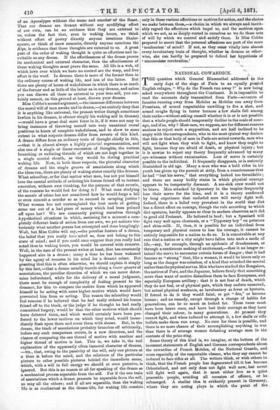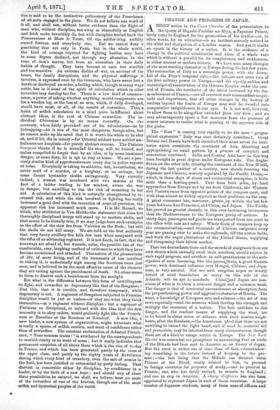NATIONAL COWARDICE.
THE question which General Blumenthal addressed in the early days of the siege of Paris to an equally puzsled English refugee, " Why do the French run away ?" is now being asked everywhere throughout the Continent. It is impossible to read the accounts daily transmitted from Paris—accounts of fanatics running away from Mobiles as Mobiles ran away from Prussians, of armed respectables unwilling to fire a shot, and armed roughs flying in terror because a few shells fall among their ranks—without asking oneself whether it is or is not possible that a whole people should temporarily decline in the scale of cour- age, and if so, why ? Most men, we suppose, are for different reasons anxious to reject such a supposition, and are half inclined to be angry with the correspondents, who in the most cynical way declare that this or that body of men in Paris are actual cowards, men who will not fight when they wish to fight, and know they ought to fight, because they are afraid of death, or physical injury ; but it is unwise to reject any theory frequently advanced by many eye-witnesses without examination. Loss of nerve is certainly possible to the individual. It frequently disappears, or is seriously diminished in old age. Many a man who was a bold rider in his youth has given up the pursuit at sixty, from a consciousness that he had " lost his nerve," that everything looked too formidable ; and there are many bodily states in which physical courage appears to be temporarily dormant. A sea-sick crew would not be brave. Men attacked by dysentery in the tropics• frequently lose their nerve for the time, and it is a theory confirmed by long experience that underfed men will rarely fight well. Indeed, there is a belief very prevalent in the world that diet has a direct effect on courage, though the rule according to which diet operates, hardly appears so clear to modern observers as it did to good old Froissart. He believed in beef ; but a Spaniard will fight very well upon chestnuts, or a " Tipperary boy" on potatoes and skim-milk. If, then, it is possible for an individual from temporary and physical causes to lose his courage, it cannot be entirely impossible for a nation to do so. It is conceivable at any rate that a nation or a city might have fallen into such a mode of life,—say, for example, through an epidemic of drunkenness, or through a continuous seeking of excitement,—that it no longer re- tained the nerve to encounter certain forms of danger ; that it had become so " strung " that, like a woman, it would be brave only so long as the danger was noiseless, of a kind that attacked the mental rather thanthephysieal nerves. Men who have studied the Bengalees, the natives of Peru, and the Japanese, believe firmly that something more than want of motive disinclines them to face Europeans, and especially European artillery ; that it is not fear of death, which they do not feel, or of physical pain, which they endure unmoved, but actual physical weakness, as involuntary as fever or hysteria. If forced to do it they would faint, or get " fits," or become insane ; and no remedy, except through a change of habits for generations, can be so much as looked for. These races must have been brave once, and have lost their courage as they have changed their colour, in many generations. At present they cannot fight, and when induced to attempt it, a few shells or rifle bullets make them run away. No cure for them is possible, and there is no more chance of their accomplishing anything in war than there is of average women defeating average men in the contests of the prize-ring.
Some theory of this kind is, we imagine, at the bottom of the incessant statements of English and German correspondents about the cowardice of French Mobiles, of the National Guards, and more especially of the respectable classes, who they say cannot be induced to face rifles at all. The writers think, or wish others to think, that the French people has degenerated till it has become Orientalized, and not only does not fight well now, but never will fight well again, that it must either live as a quiet peaceable people, avoiding all occasion of offence, or be submerged. A similar idea is evidently present in Germany, where they are acting plays in which the point of the
fun is said to be the instinctive poltroonery of the Frenchmen of all sorts engaged in the piece. We do not believe one word of
it all, and shall not, without better evidence than the flight of men who, without discipline, ran away as shamefully as English and Irish mobs invariably do, but with discipline hurled back the Pomeranians at Mars le Tours, till the soldier-king audibly cursed fortune and everybody else. But we cannot deny a possibility that not only in Paris, but in the whole world, the kind of courage required for fighting battles may have in some degree declined, not through any alteration in the tone of men's nerves, but from an alteration in their daily habits of thought. They have become at once too sensible and too sensitive. An extreme dislike of war, on account of the losses, the family disruptions, and the physical sufferings it involves, is expressed even by the Germans, who have never lost a battle or disobeyed an order, a feeling which, though in many ways noble, has in it some of the spirit of calculation which in other .countries may develop too far. There is a low kind of common- sense, a power of asking whether anything would compensate one for a wooden leg, or the loss of an arm, which, if hilly developed, would have most, or all, of the results of cowardice. This, a habit of selfish calculation in a mind quite indifferent about abstract ideas, is the root of Chinese cowardice. The in- dividual Chinaman is by no means cowardly. On the contrary, when fairly provoked out of his calculations—as by kidnapping—he is one of the most dangerous beings alive, but be cannot make up his mind that it is worth his while to be shot at, and if hit, die in misery—for Oriental soldiers have neither am- bulances nor hospitals—for purely abstract reasons. The Parisian 'bourgeois thinks if he is wounded his shop will be ruined, and 'sinless compelled to forget that by an idea, or by some imminent -danger, or some duty, he is apt to stay at home. We see a pre- cisely similar kind of apprehensiveness every day in police reports at home. Everybody is taking to athletics, bat, nevertheless, we never read of a murder, or a burglary, or an outrage, but some decent bystander skulks outrageously. Very recently indeed, a woman was murdered with two masons at the foot of a ladder leading to her window, aware she was in danger, but unwilling to run the risk of mounting to her -aid. A calculation of this kind is naturally strengthened by in- .-creased risk, and while the risk involved in fighting has really increased a good deal with the invention of arms-of-precision, the apparent risk has increased much more. It is Mr. Russell, we think, who attributes to Von Moltke the statement that none but -thoroughly disciplined troops will stand up to modern shells, and that seems to be literally true, if we may judge from such examples as the effect of the slow fire from Valerien on the Reds ; but still the shells do not kill many. We are told on the first authority that very heavy artillery fire kills few men when compared with the rifles of an advancing regiment. It is not death, in fact, that the runaways are afraid of, but wounds, noise, the possible loss of the -comfortable, easy, laughing method of existence to which they have become accustomed and attached. This notion of the pleasantness of life, of mere living, and of the immensity of loss involved in risking it, is undoubtedly high among the Southern races just .now, and is believed to be the most effective cause of the clamour they are raising against the punishment of death. No crime seems 'to them to deserve such a banishment from the sunlight.
But what is the difference between this form of unwillingness 'to fight, and cowardice or degeneracy like that of the Bengalees ? -Just this, that it is curable, and therefore temporary, while degeneracy is not. A regiment of Bengalees subjected to Prussian -discipline would be just as useless—if they are what they think 4hemselves—as a regiment without discipline ; but a regiment of Parisians so disciplined, so imbued with the idea that the first necessity is to obey orders, would probably fight like the French- men at Borodino or the Russians at Zorndorf. A new idea, a new leader, a new system of organization, might terminate what is really a spasm of selfish caution, and want of confidence rather 'than of cowardice. The constant exclamation of defeated French- men, " NOM sommes trahis !" is attributed by the correspondents to morbid vanity or to want of sense ; but it really 'indicates that :permanent suspicion of all above them which is the vice of to-day in France, and which has been generated partly by the vices of the upper class, and partly by the eighty years of Revolution -during which every kind of treachery, even the sale of armies in the field, has been justified or extenuated by party feeling. That -distrust is removable either by discipline, by confidence in a leader, or by the birth of a new hope ; and should any of these three possibilities be secured, we shall, we believe, hear no more of the cowardice of one of the bravest, though one of the most selfish and hysterical peoples of the world.



































 Previous page
Previous page